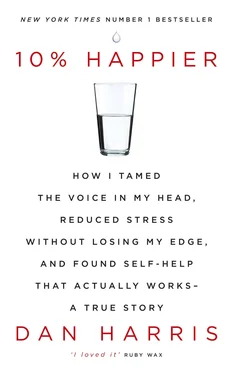“Instant gratification just got faster. Shop Vogue-dot-com.”
Everyone laughs.
“Another slogan says, ‘I don’t let anything stand in the way of my pleasure.’ ”
“The best one of all,” he says, pausing for effect, in a wait-for-it kind of way, chuckling to himself as he lets our curiosity build.
“ ‘To be one with everything . . . you need one of everything.’ ”
The zombies erupt, as Goldstein lets out a series of gentle, high-pitched honks.
He goes on to answer one of my biggest questions, the one about Buddhism’s vilification of desire. It’s not that we can’t enjoy the good stuff in life or strive for success, he says. The key is not to get carried away by desire; we need to manage it with wisdom and mindfulness. Quite helpfully, he adds that he is by no means perfect on this score. He tells a story about his early years of intensive meditation in India in the 1960s. “My practice was going quite well, and the mind was quite concentrated. And it’s the kind of sitting where you think you’re going to get enlightened any minute,” he says with, I think, tongue in cheek. He explains that, at teatime at this retreat center, the yogis would be given a small cup of tea and a little banana. “So I’m sitting there, about to get enlightened and the tea bell rings.” Comic pause. “Enlightenment or banana?” Another pause. He’s cracking himself up again. “More often than not, go for the banana.”
The humor is a relief. As is his love for the material. After a day of wondering whether sitting and watching my breath is perhaps the stupidest conceivable pursuit, Goldstein’s talk is a welcome reminder of Buddhism’s intellectual superstructure. His enthusiasm is palpable and infectious. He discusses verses from the Buddha like a sommelier rhapsodizing over a 1982 Bordeaux.
“In one discourse, he captured the whole game in just a few words. These lines, if you heard these lines in the right way, you could get enlightened,” he says, chuckling again. “So here’s your chance . . .”
He’s talking about a verse where the Buddha calls everything we experience—sights, sounds, smells, etc.—the “terrible bait of the world.”
“It’s . . . an amazing statement,” he says. “Moment after moment, experiences are arising, and it’s as if each one has a hook . . . and we’re the fish. Do we bite? Or do we not bite, and just swim freely in the ocean?”
I’m thinking: Yes, right—there is a point to sitting around all day with your eyes closed: to gain some control over the mind, to see through the forces that drive us—and drive us nuts.
As he deconstructs various parts of the Buddhist scriptures, it strikes me that Goldstein is what you get when a brainy, intense Jew like my father decides to build an entire career out of Buddhism. I assume Goldstein’s parents would have preferred him to be a lawyer or a doctor, but instead he’s basically become a Talmudic scholar of Buddhism. And somehow, that accent, so much like my dad’s, makes me like him even more.
As the speech goes on, however, he starts to lose me. Earlier, he was joking about enlightenment, but now he’s speaking without irony about rebirth, karma, “purifying the mind” and achieving “liberation.” He closes by saying that the dharma “leads to calm, ease, and Nibbana.” (An alternate pronunciation of Nirvana.)
Oy. Way to ruin a great talk.
At the end of the last sitting of the day, another unpleasant surprise: more chanting. This time, it’s the metta chant, where we send “loving-kindness” to a whole series of “beings,” including our parents, teachers, and “guardian deities.” We wish for everyone to experience the End of Suffering.
It occurs to me that perhaps the quickest way for me to achieve the End of Suffering would be to go home.
Day Three
I have a line running through my head from Chappelle’s Show , indisputably the funniest show in the history of television. In one of the sketches, Dave Chappelle appears in a “Hip-Hop News Break” as “Tron,” a “Staten Island man” who has been brutally attacked by members of the rap group the Wu-Tang Clan. Lying in a hospital bed surrounded by reporters, he says the rappers had sewn his anus shut and “kept feeding me and feeding me and feeding me.”
“It was torture—straight torture, son.”
That phrase—“straight torture, son”—keeps bouncing through my skull as I rotate, with the rest of the zombies, between sitting meditation, the Ministry of Silly Walks routine, and waiting in line at the dining hall to fill our bowls with grains and greens. I’m flat-out loathing this experience.
Late morning, I’m lingering, bored, in front of the message board in the foyer outside the meditation hall. With a frisson of excitement, I notice there’s a note for me. It’s from Goldstein. In neat, handwritten script on a small, white sheet of paper, he suggests we meet in about an hour. As the note explains, yogis are supposed to have regular interviews with the teachers, to discuss our practice. Since I didn’t get on his schedule today, he’s carving out some extra time. Around here, this is the closest you’ll get to a thrill.
At the appointed hour, I’m at the main office, taking off my shoes and pushing open the screen door. I pad into the carpeted room, where Goldstein is using his unreasonably long arms to pull an office chair directly in front of the big, fluffy love seat he’s planning to occupy. He pats the office chair, indicating I sit down.
One-on-one, he’s even looser than he was during the dharma talk. As is my wont, I pepper him with biographical questions. Turns out he was raised in the Catskills, where his parents owned a hotel for Jews from New York City. This explains his comic timing; he literally grew up in the borscht belt.
I feel privileged to have this audience, but also mildly stressed. I have a million questions, and yet I don’t want to overstay my welcome. He has a clock prominently displayed on the little table next to his chair, just like Dr. Brotman has on his desk.
I start with the most acute problem. “My mouth is filling with saliva all the time and it’s messing up my ability to concentrate.”
He laughs and assures me that, for some reason, this seems to happen to a lot of meditators. I find this enormously comforting. He suggests I give myself permission to swallow. Don’t fixate on it, he advises, or it’ll get worse. He says his mother—“a very intense woman”—used to have the same problem, except she refused to swallow, not wanting to cave to her urges, and would let it all run down the front of her dress. I am dying to hear how he convinced his Jewish mother to meditate, but I don’t have that kind of time.
He asks how my practice is going, generally. Not wanting to reveal the full extent of my despair, I allow that I’ve had some low moments, but then add that even as I was experiencing those moments, I knew they would pass. He smiles wide, slaps his knees, and says, “That’s the whole game!” It’s another useful reminder of why we’re here: to learn how to not get carried away by the clatter of the mind.
After fifteen minutes, I figure I’ve used up all of my time. The meeting was brief, but hugely satisfying. This guy really is a gem, a mensch. He’s like an emissary sent down every back alley and culde-sac of the mind, so that the rest of us can tell him our problems and he can say, “Oh yeah, I’ve been there, and here’s how you deal with it.”
This era of good feelings is brief. In one of the midafternoon seated meditation sessions, a teacher named Spring takes the podium and announces that today “We’re going to try something different.”
Читать дальше












